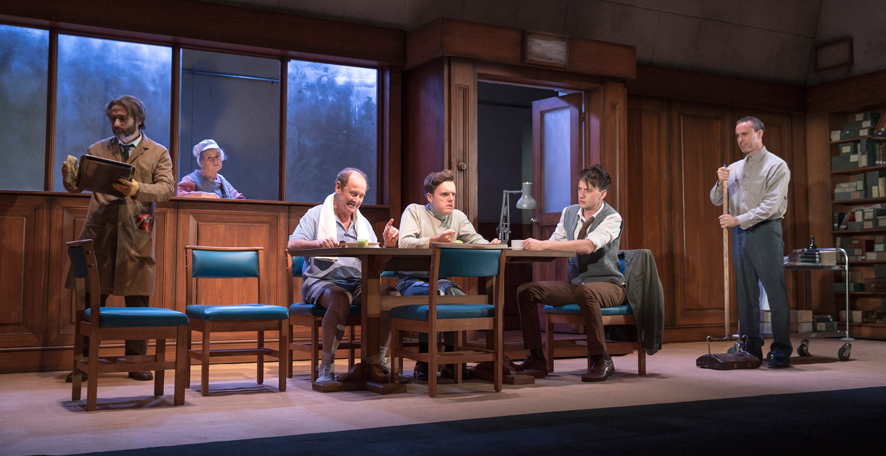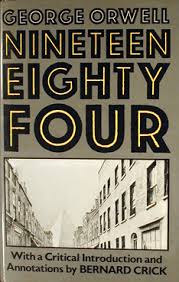On a fine, clear winter’s Saturday with a temperature of 18C off we went to the Rocks to see a play featuring torture: à chacun son gout, as the clock struck thirteen. It was small town Sydney again. We drove in, and parked in front of the theatre and went a few doors down for a pasta lunch in the sun before entering the Orwellian world. When we left we went to the car and were home in twenty minutes or less.
George Orwell wrote ‘Nineteen Eight-Four’ in 1948 and derived the year for the future world he imagined by reversing the digits. But that was a long time ago, both for 1948 and 1984.
it is a long and dense book, making it a challenge to condense into 90-100 minutes, that being the average theatre-goer’s endurance. Robert Icke and Duncan Macmillan contrived Orwell’s story within the frame of a bookclub discussion, which sped up the exposition, a nice idea well executed.

In addition there was a video screen on the back wall used for some closeups and some the off stage action (sex). This was another very nice piece of staging. There were also feeds from a camera man on stage during the torture for those that like that sort of thing.
Effective use of lighting and sound added to the excitement, though it got repetitive after the fifth time. Less can be more in these things.
We were among the gods so there is no comment on the acting, though I was sure that there were actors on the stage, no faces made it to row ZZZ, except for those on the video screen, for which thanks.
Mercifully Icke and Macmillan did not try to improve on Orwell, as I have seen adapters try to improve on Shakespeare, believe it or not, but within the frame of the book club they let the story unfold as it does in the novel. However, like many other producers and directors, they missed one vital point. Their Winston Smith is a young man, whereas Orwell’s is older, and with good reason. He is jaded and cynical from experience. The actor here is a boy, and he is played as a boy. His actions are impetuous not measured. His fatalism is intellectual,not emotional. I have likewise seen productions with a young MacBeth, when the whole impetus of the Scottish play is that MacBeth, while at his peak, is ageing and his last chance is now. I have even seen a young King Lear, more an older bother to Cordelia, than the wizened, exhausted statesman Shakespeare had in mind.
Seeing this performance has inspired me to read Bernard Crick’s essay on ‘Nineteen Eight-Four’ in the edition he prepared in 1984, and also perhaps, later, his biography of Orwell.
In that year of 1984 at New College (built in 1379, when the plumbing went in) of Oxford University I saw Crick, in a seminar of twenty, present a paper about the novel to promote the book. It was the most brilliant conference presentation I had ever seen, and still is. If ever a man was born to do a job, Bernard Crick was born to channel George Orwell. It was as it Orwell were in the room with us. While Crick spoke, or paused, I did not notice that in January the room was unheated; I did not notice the spring poking through the dilapidated chair upon which I was perched; I did not faint from hunger after the college breakfast of hard bread and brown water.

Years later when Crick travelled to Australia and shopped himself for the pathetic seminar fees universities pay, someone asked me if we should host him. YES! I shouted, and stumped up all the dosh I could find around the place (being Head of Department at the time, I filled out forms).
This is the same Bernard Crick (1929-2008) who wrote one of the best freshmen textbooks ever, ‘In Defence of Politics’ (1962). He was also famous in those distant days for leaving a prestigious post at a British university to go teach in a night school for working class adults. The Wikipedia entry finesses this point.
Back to the play, some liberties were taken with the mention of screens, and the paraphrase of Neo from ’The Matrix’ at the end. I did not bridle at those, but they were unnecessary. If the play worked, they were redundant, and if it did not communicate, they were superfluous. They were there, I guess, to show the audience it is up-to-date.
Yes, the torture is there and it is unpleasant but it is less repellent than the blood and gore splashed over the screen in the latest shock-and-awe CGI blockbuster from Hollywood.
I first came across ‘Nineteen Eighty-Four’ on the after high school movie from a local channel which I used to watch after school and before sports. I often missed either the beginning or the end, or both. I missed the start of ‘Nineteen Eighty-Four’ (1956) and there was Winston (Edmond O’Brien) feeding paper files down the memory hole at the Ministry of Truth. That was an attention getter compared to the usual fare of swashbucklers and westerns, so I paid more attention than usual. I went from there to the book.

Skip to content
